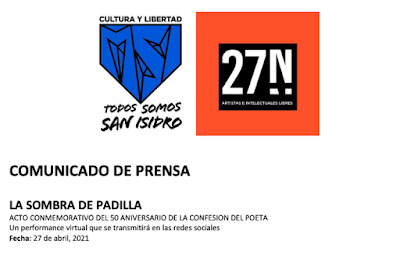"Cuban poets no longer dream (not even at night)." - Heberto Padilla
 |
| Heberto Padilla |
Heberto Padilla, a Cuban poet, who like many had been an enthusiastic supporter of Fidel Castro ousting Cuban dictator Fulgencio Batista, became disillusioned when the Castro regime's dictatorial nature became clear, and reflected it in his writings.
One: be an optimist.
Two: be discreet, correct, obedient.
(Do well at sports - all of them.)
And, most of all, move
like all the other members:
one step forward, and one (or two) steps back:
but never stop cheering.
In 1968, however, Cuban judges in the national poetry contest awarded their "Julian del Casal" poetry prize to Padilla's collection, Fuera del Juego (Out of the Game), which contained critical lines such as:
He has no business here.
He doesn't play the game.
He never gets excited
Or speaks out clearly.
He never even sees the miracles ..."
The book was published but an addendum was added that criticized the work as counterrevolutionary, and Heberto Padilla was placed under house arrest. On March 20, 1971 he was arrested together with his wife,Belkiz Cuza Malé, after armed state security agents burst into their home. She was released a short time later. He was interrogated for over a month, then released, and on April 27, 1971 forced to confess before the National Union of Writers and Artists of Cuba (Unión Nacional de Escritores y Artistas de Cuba, UNEAC).
Half a century later on Tuesday, April 27, 2021, a choral reading of Heberto Padilla’s confession will be streamed via social media over 24 hours.
Twenty Cuban intellectuals from the island and the diaspora, directed by Cuban American artist Coco Fusco, are participating in the project organized by the San Isidro International Movement and 27N.
Heberto Padilla would suffer ostracism, and harassment until 1979 when he went into exile, and continued his criticism of the Castro regime, and in 1984 appeared in the film "Improper Conduct" where his case was highlighted, and he discussed Raul's Castro visit to Bulgaria and saw that the streets were very clean, without anti-social elements, especially the homosexuals, and was told by the Bulgarian communists that they had been placed in camps. Raul Castro returned to Cuba and instituted the practice with his brother, Fidel's approval in the 1960s. Below is a clip, but FCF members will be viewing the full film online tonight at 8:00pm EST here.



